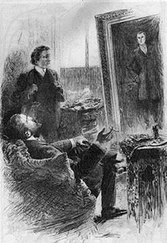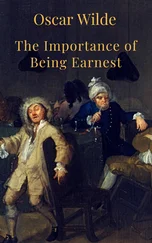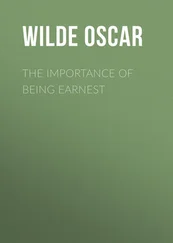"O why?" She spoke like one hurt. Then I confessed my suspicions. "O, You're foolish," she exclaimed softly, appearing relieved. "Besides," she went on brightly "Jessie isn't a spoiled girl, you wait until you meet her." And in spite of my protests she sent the landlady's little girl off for Miss Rooks. She came over in about an hour and I found her to be demure and thoughtful, as well as pretty. She was small of stature, had dark eyes and beautiful wavy, black hair, and an olive complexion. She wouldn't allow me to look into her eyes but continued to cast them downward, sitting with folded hands and answering when spoken to in a tiny voice quite in keeping with her small person.
During the afternoon I mentioned that I was going to Chicago, "Now Oscar, you've got no business in Chicago," my sister spoke up with a touch of authority. "You're too young, and besides," she asked "do you know whether W.O. wants you?" W.O. was our oldest brother and was then making Chicago his home.
"Huh!" I snorted "I'm going on my own hook," and drawing up to my full six feet I tried to look brave, which seemed to have the desired effect on my sister.
"Well" she said resignedly, "you must be careful and not get into bad company—be good and try to make a man of yourself."
CHAPTER III
CHICAGO, CHASING A WILL-O-THE-WISP
Table of Contents
That was on Sunday morning three hundred miles south of Chicago, and at nine-forty that night I stepped off the New Orleans and Chicago fast mail into a different world. It was, I believe, the coldest night that I had ever experienced. The city was new and strange to me and I wandered here and there for hours before I finally found my brother's address on Armour Avenue. But the wandering and anxiety mattered little, for I was in the great city where I intended beginning my career, and felt that bigger things were in store for me
The next day my brother's landlady appeared to take a good deal of interest in me and encouraged me so that I became quite confidential, and told her of my ambitions for the future and that it was my intention to work, save my money and eventually become a property owner. I was rather chagrined later, however, to find that she had repeated all this to my brother and he gave me a good round scolding, accompanied by the unsolicited advice that if I would keep my mouth shut people wouldn't know I was so green. He had been traveling as a waiter on an eastern railroad dining car, but in a fit of independence—which had always been characteristic of him—had quit, and now in mid-winter, was out of a job. He was not enthusiastic concerning my presence in the city and I had found him broke, but with a lot of fine clothes and a diamond or two. Most folks from the country don't value good clothes and diamonds in the way city folks do and I, for one, didn't think much of his finery.
I was greatly disappointed, for I had anticipated that my big brother would have accumulated some property or become master of a bank account during these five or six years he had been away from home. He seemed to sense this disappointment and became more irritated at my presence and finally wrote home to my parents—who had recently moved to Kansas—charging me with the crime of being a big, awkward, ignorant kid, unsophisticated in the ways of the world, and especially of the city; that I was likely to end my "career" by running over a street car and permitting the city to irretrievably lose me, or something equally as bad. When I heard from my mother she was worried and begged me to come home. I knew the folks at home shared my brother's opinion of me and believed all he had told them, so I had a good laugh all to myself in spite of the depressing effect it had on me. However, there was the reaction, and when it set in I became heartsick and discouraged and then and there became personally acquainted with the "blues", who gave me their undivided attention for some time after that.
The following Sunday I expected him to take me to church with him, but he didn't. He went alone, wearing his five dollar hat, fifteen dollar made-to-measure shoes, forty-five dollar coat and vest, eleven dollar trousers, fifty dollar tweed overcoat and his diamonds. I found my way to church alone and when I saw him sitting reservedly in an opposite pew, I felt snubbed and my heart sank. However, only momentarily, for a new light dawned upon me and I saw the snobbery and folly of it all and resolved that some day I would rise head and shoulders above that foolish, four-flushing brother of mine in real and material success.
I finally secured irregular employment at the Union Stock Yards. The wages at that time were not the best. Common labor a dollar-fifty per day and the hours very irregular. Some days I was called for duty at five in the morning and laid off at three in the afternoon or called again at eight in the evening to work until nine the same evening. I soon found the mere getting of jobs to be quite easy. It was getting a desirable one that gave me trouble. However, when I first went to the yards and looked at the crowds waiting before the office in quest of employment, I must confess I felt rather discouraged, but my new surroundings and that indefinable interesting feature about these crowds with their diversity of nationalities and ambitions, made me forget my own little disappointments. Most all new arrivals, whether skilled or unskilled workmen, seeking "jobs" in the city find their way to the yards. Thousands of unskilled laborers are employed here and it seems to be the Mecca for the down-and-out who wander thither in a last effort to obtain employment.
The people with whom I stopped belonged to the servant class and lived neatly in their Armour Avenue flat. The different classes of people who make up the population of a great city are segregated more by their occupations than anything else. The laborers usually live in a laborer's neighborhood. Tradesmen find it more agreeable among their fellow workmen and the same is true of the servants and others. I found that employment which soiled the clothes and face and hands was out of keeping among the people with whom I lived, so after trying first one job, then another, I went to Joliet, Illinois, to work out my fortune in the steel mills of that town. I was told that at that place was an excellent opportunity to learn a trade, but after getting only the very roughest kind of work to do around the mills, such as wrecking and carrying all kinds of broken iron and digging in a canal along with a lot of jabbering foreigners whose English vocabulary consisted of but one word—their laborer's number. It is needless to say that I saw little chance of learning a trade at any very early date.
Pay day "happened" every two weeks with two weeks held back. If I quit it would be three weeks before I could get my wages, but was informed of a scheme by which I could get my money, by telling the foreman that I was going to leave the state. Accordingly, I approached the renowned imbecile and told him that I was going to California and would have to quit and would like to get my pay. "Pay day is every two weeks, so be sure to get back in time," he answered in that officious manner so peculiar to foremen. I had only four dollars coming, so I quit anyway.
That evening I became the recipient of the illuminating information that if I would apply at the coal chutes I would find better employment as well as receive better wages. I sought out the fellow in charge, a big colored man weighing about two hundred pounds, who gave me work cracking and heaving coal into the chute at a dollar-fifty per twenty-five tons.
"Gracious", I expostulated. "A man can't do all of that in a day".
"Pooh", and he waved his big hands depreciatingly, "I have heaved forty tons with small effort".
I decided to go to work that day, but with many misgivings as to cracking and shoveling twenty-five tons of coal. The first day I managed, by dint of hard labor, to crack and heave eighteen tons out of a box car, for which I received the munificent sum of one dollar, and the next day I fell to sixteen tons and likewise to eighty-nine cents. The contractor who superintended the coal business bought me a drink in a nearby saloon, and as I drank it with a gulp he patted me on the shoulder, saying, "Now, after the third day, son, you begin to improve and at the end of a week you can heave thirty tons a day as easily as a clock ticking the time". I thought he was going to add that I would be shoveling forty tons like Big Jim, the fellow who gave me the job, but I cut him off by telling him that I'd resign before I became so proficient.
Читать дальше












